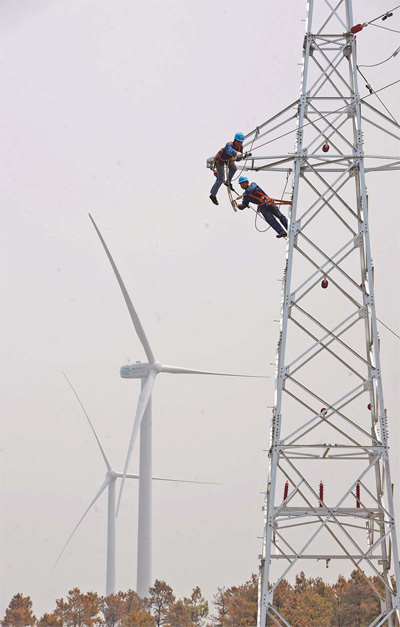Economy
Production battles against the dark ages
Updated: 2011-05-10 07:49
By Wang Zhenghua and Wu Yiyao (China Daily)
More, more, more
Despite the short supply, the consumption of electricity in the country exploded in the first quarter, gaining 12.7 percent from a year earlier. Power use in March alone increased 13.4 percent from a year earlier.
Droughts affecting large areas of China boosted the use of electric irrigation equipment. Recovering economies encourage enterprises, especially manufacturers, to take more orders, which consumes more electricity.
And the resurgence of industries that are big energy consumers pushes up demand even further. It is that high consumption that worsened the power shortage in Zhejiang, said Yang Jianhua, a researcher at the provincial academy of social sciences.
Official figures show that investment in fixed assets rose 29 percent year-on-year for the first quarter in Zhejiang, while power consumption in high-energy sectors such as the chemical industry and non-ferrous metal production climbed 20 percent.
In Jiangsu, power consumption in industrial sectors jumped 23 percent in February year-on-year, as important industrial cities including Changzhou, Yancheng, Yangzhou and Lianyungang reported more than a 30 percent surge in electricity for industrial use.
Remedies
The National Development and Reform Commission has raised the electricity price in 16 provinces, making an average increase of 0.012 yuan a kWh for industrial use. The pricing of electricity in China is subject to approval of the central government.
The old electricity price was not adequate in an age of skyrocketing costs for coal, and the power shortage reflects that, said Zhou Dadi, vice-director of China Energy Research Society. And it's time to optimize the mechanism so it synthesizes the primary energy price and sales price, Zhou said.
For power plants, a comprehensive energy production and logistic system is perhaps a more plausible and beneficial approach in the long run, since raising electricity prices is largely not realistic and would greatly affect other industries.
Local government, for example, could make plans to ensure coal storage and provide stipends to power plants in case the money allocated to buy coal runs short, said China Electricity Council's Xue.
The shipment of coal could be made easier, reducing costs, if governments gave subsidies to power plants on coal delivery.
Constructing new power projects would be a solution to the power shortage, experts said. Power projects, especially a number of large and medium-scale hydropower projects, could considerably narrow the demand-supply gap. Developing efficient nuclear power under the premise of ensured safety would also help.
Also, the nation should continue to tightly control the development of high-energy-consuming sectors and highly polluting industries, pursuing a new growth approach, the experts said.
Local governments thus face a quandary: Can they maintain robust economic growth if it means losing the old, power-hungry economic growth engines?
"We understand that the government favors the high-tech industries and tries not to hurt them in the power crunch," Henghui's Xu said. "But the government should be cautious that industries such as chemical fiber still have a large production capacity and contribute a lot to local economy."
|
|
Specials

2011 Sino-US Dialogue
China and the United States will hold the third round of the Strategic and Economic Dialogue from May 9-10 in Washington.

Bin Laden dead
The world's most wanted man was killed in a US raid in Pakistan.

US-style sports camp
The US sports camp company, Camp Woodward, will open its first residential camp in Beijing in June.
